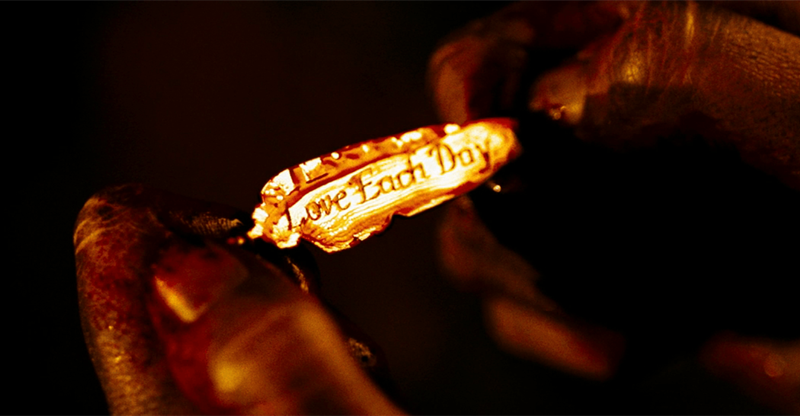Sometimes you just don’t connect with a film in any way. A half hour into “Tie Me Up! Tie Me Down!” (1990) I was wondering why anything that was happening was actually happening. After that, I focused mainly on checking how much running time was left. This puts it in the same group with just about every other Pedro Almodovar film I’ve seen, as well as almost every film by any director who speaks about a “vision of desire” as a central theme in his or her work.
I’ve spent a week searching for something to say about a film I have almost nothing to say about, and I stumbled on this quote from the late, great Roger Ebert: “Almodovar’s polarities are so perfectly lined up in opposition to my own that it is quite possible for one of his movies to shoot right through my brain without striking a single cell.” Sometimes Mr. Ebert could knock it out of the park.
You probably want to know at least a little bit about this cult hit, however. Recently released mental asylum patient Ricki (Antonio Banderas) kidnaps B-movie actress Marina (Victoria Abril). Ricki’s plan, to the degree is capable of forming a plan, is to force Marina to get to know him which he is certain means she will grow to love him, no matter if it takes bondage and a few murderous threats to keep her attention. Lo and behold, Ricki’s plan actually works. Marina loves him. The end.
From that description, you can understand why the film generated considerable controversy on its initial release. It was slapped with an X-rating in the States, a ruling which Miramax fought but lost, eventually releasing it unrated to considerable box office success. The lawsuit helped lead to the implementation of a new NC-17 rating which would first be used later in 1990. Other groups protested the film’s depiction of a woman who enjoys being violently abused.
Any perceived controversy was likely based more on a summary of the film than the actual experience of watching it. While Ricki can be brutally menacing from time to time (Banderas is marvelous at switching instantly from sweetly naïve to violently psychotic), the film’s tone is so campy and off-kilter it’s hard to take any of it seriously. If it’s possible for a movie in which a woman gets punched in the face, tied up, and repeatedly threatened with a knife to be too precious and slight (on a related note, Wes Anderson is a big fan), this one pulls it off.
It’s equally hard to find any of it particularly funny, at least for me (one exception is a very amusing fake advertisement explaining the difference between the Spanish and German ways of planning for retirement). Which explains why I was left with that feeling of opposed polarities. It’s just 102 minutes of some pictures and some noise and then it’s over. Hey, if you love every movie you see and “get” every idiosyncratic director, you have a serious disorder.
But the film has its devoted fans (what film doesn’t anymore?) whose polarities, I guess, are more closely aligned to Almodovar’s. Banderas and Abril give it their best and the movie is dominated by some gorgeous saturated colors so that’s something at least.
Video:
The film is presented in its original 1.85:1 aspect ratio. Red is the warmest color here and it absolutely radiates on this restored transfer, lots of vibrant greens as well. Image detail is sharp throughout in this nearly flawless high-definition transfer.
Audio:
The DTS-HD Master Audio 5.1 surround track has its dynamic moments and is crisp and clear throughout. I sheepishly admit that during the film I was thinking that the soundtrack was pretty lousy only to find out it’s by Ennio Morricone so let’s just chalk that up to being bored by the rest of the film. In any case, the lossless audio presents the score very well. Optional English subtitles support the Spanish audio.
Extras:
There’s not a ton of material, but Criterion has put together enough to give fans an hour of engagement. “Untied!” (28 min.) is a 2014 feature consisting of interviews with Pedro Almodovar, his brother and producer Agustin Almodovar, Banderas, Abril, and other cast and crew members. We also get a new 2014 interview (15 min.) with Michael Barker, co-founder of Sony Pictures Classics, who helped bring to market some of Almodovar’s earlier features. The disc also includes a 2003 conversation (26 min.) between Pedro Almodovar and Banderas. The short feature “Resistré” (4 min.) shows the cast and crew breaking into song at the 1989 Madrid premiere of the film. The last feature is a Theatrical trailer (2 min.)
The 24-page insert booklet includes an excerpt from the 1989 press book written by Pedro Almodovar, a separate interview with Almodovar conducted in 1989, and a conversation between critic Kent Jones and filmmaker Wes Anderson.
Film Value:
This seems to be Criterion’s month to release titles that everyone other than me loves. Which means you’ll probably love this. And if you do, you’ll no doubt be pleased with the fine job Criterion has done on the transfer as well as the extras.


